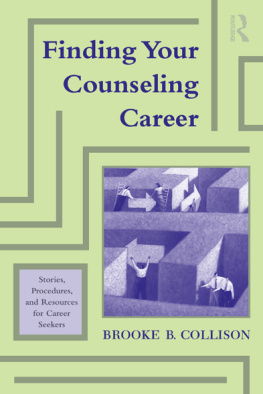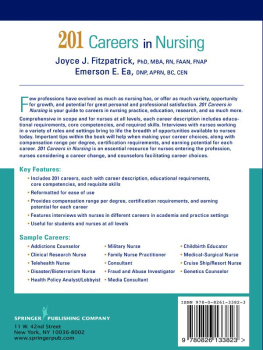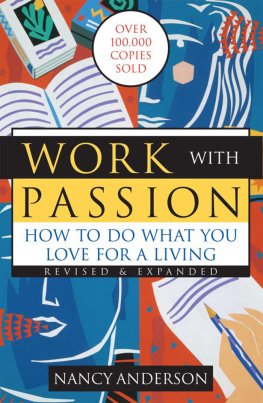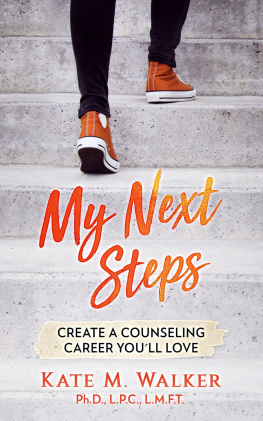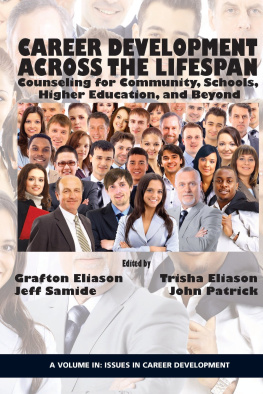Finding Your Counseling Career
Finding Your Counseling Career
Stories, Procedures, and Resources for Career Seekers
Brooke B. Collison

New York London
Routledge
Taylor & Francis Group
270 Madison Avenue
New York, NY 10016
Routledge
Taylor & Francis Group
27 Church Road
Hove, East Sussex BN3 2FA
2010 by Taylor and Francis Group, LLC
Routledge is an imprint of Taylor & Francis Group, an Informa business
This edition published in the Taylor & Francis e-Library, 2011.
To purchase your own copy of this or any of Taylor & Francis or Routledges collection of thousands of eBooks please go to www.eBookstore.tandf.co.uk.
ISBN 0-203-87765-9 Master e-book ISBN
International Standard Book Number: 978-0-415-80039-6 (Hardback) 978-0-415-80040-2 (Paperback)
For permission to photocopy or use material electronically from this work, please access www.copyright.com (http://www.copyright.com/) or contact the Copyright Clearance Center, Inc. (CCC), 222 Rosewood Drive, Danvers, MA 01923, 978-750-8400. CCC is a not-for-profit organization that provides licenses and registration for a variety of users. For organizations that have been granted a photocopy license by the CCC, a separate system of payment has been arranged.
Trademark Notice: Product or corporate names may be trademarks or registered trademarks, and are used only for identification and explanation without intent to infringe.
Library of Congress Cataloging in Publication Data
Collison, Brooke B.
Finding your counseling career : stories, procedures, and resources for career
seekers / Brooke Collison.
p. cm.
Includes bibliographical references and index.
ISBN 978-0-415-80039-6 (hardcover : alk. paper) -- ISBN 978-0-415- 80040-2
(pbk. : alk. paper)
1. Counseling--Vocational guidance. I. Title.
BF636.64.C65 2010
158.3023--dc22 2009053735
Visit the Taylor & Francis Web site athttp://www.taylorandfrancis.com
and the Routledge Web site athttp://www.routledgementalhealth.com
I appreciate the encouragement of my spouse, Joan, throughout the process of writing this book. I also appreciate the contributions that Nancy Garfield made, even though she was not able to write chapters for this edition. I particularly appreciate the willingness of the 14 people I interviewed for the profile section. And I appreciate the interviewees all giving me permission to use their names and their places of work in order to give the profiles a firm touch of reality for you, the reader. Thanks to all of you.
BBC
Corvallis, Oregon
Contents
PREFACE
This book, Finding Your Counseling Career, comes as the third generation of a project that began several years ago with my colleague, Dr. Nancy Garfield. Earlier volumes, entitled Careers in Counseling and Human Services (American Association for Counseling and Development, 1990) and Careers in Counseling and Human Development (Taylor & Francis, 1996), were collections of chapters written by a set of experts, each of whom could speak to the kinds of counseling careers found in different settingselementary and secondary schools, colleges, business and industry, private practice, rehabilitation settings, and the like.
Dr. Garfield and I worked and taught courses together when we were both at Wichita State University, Kansas. We share a common philosophy about the way that people make decisions to enter one of the human service professions. We both believe there was more unknown than known about the counseling fields that people were considering, and we wanted a book for students that would give them both an introduction to different human service professions as well as suggestions about their decision-making process.
The second book, Careers in Counseling and Human Services, was published by Taylor & Francis. Dr. Garfield and I thought we had finished our work. We also thought that the book would have a fairly short life because it contained information that was, to some extent, time limited. We included some salary information and resource lists for readers, with address lists for readers to use to send mail requests.
Whether it was fortunate or unfortunate, the book remained active on the Taylor & Francis sales list long affer the time that Dr. Garfield and I thought that it would. When we received copies of sales reports, both of us would suggest that it was time to retire the publication. We sent our requests to Dana Bliss, with Taylor & Francis, who usually responded that if we thought that the book was out of date, we should write a new and updated version. Bliss was persuasive, and this volume is the result.
Dr. Garfield contributed significantly to the concepts presented in this volume. We had several long conversations at the bookstore where she now works part-time in her retirement. Health issues have prevented her from being an active writer, but she developed significant ideas about how to make this book less dated than the earlier volumes.
There are several major differences between this volume and the earlier titles. The book comes out of my computer rather than being a collection of contributed chapters. The book does not include current salary data for occupational titles but does include Internet search procedures for those who want to find salary information. The book includes more exercises and self-tests for the interested reader who wishes to explore personal characteristics and how they fit with the counseling professions.
One totally new concept in this volume is the section that includes profiles of persons who were initially in counseling positions but who have moved to different professional positions. The core element is that they continue to use their counseling skills. The idea for this section is one that emerged during conversations with Dr. Garfield, and, I must be frank, it is the element that piqued my interest enough to agree to Blisss request that we produce an updated volume.
Dr. Garfield and I agreed that the majority of books on career decision making tend to stop with entry into the initial career of interest. When we reviewed our first two volumes, we discovered that chapter writers might describe the educational process to be licensed in a particular field and then describe the job functions of a person in that field, but that was the end of their discussion. There were no extensions of the career path beyond the entry level. We both knew that for many persons in the helping professions, there is a rich life that might follow their initial entry. School counselors move on to become school administrators or college professors, counseling psychologists might leave private practice and open a consulting business, and counselors join businesses that provide services to various counseling groups or clients. The opportunity to interview people who had made such moves and be able to then present a small snapshot of their career changes and the decision processes that went into those changes posed an intriguing element that we wanted to include.
I became so involved with the value of the interviews and profiles that I strongly urge readers to follow the same process in their own career search. The concept of informational interviews is not new. I rediscovered their value as I prepared this manuscript, and when people would ask how my writing was going, my typical response would be to say that I was excited about the new elementinterviews and profiles. I will have more to say about this process in the last section of the book. I hope that the results from the interviews and profiles are valuable to you. I also hope that you will get caught up in the value of the process and will conduct your own interviews.

